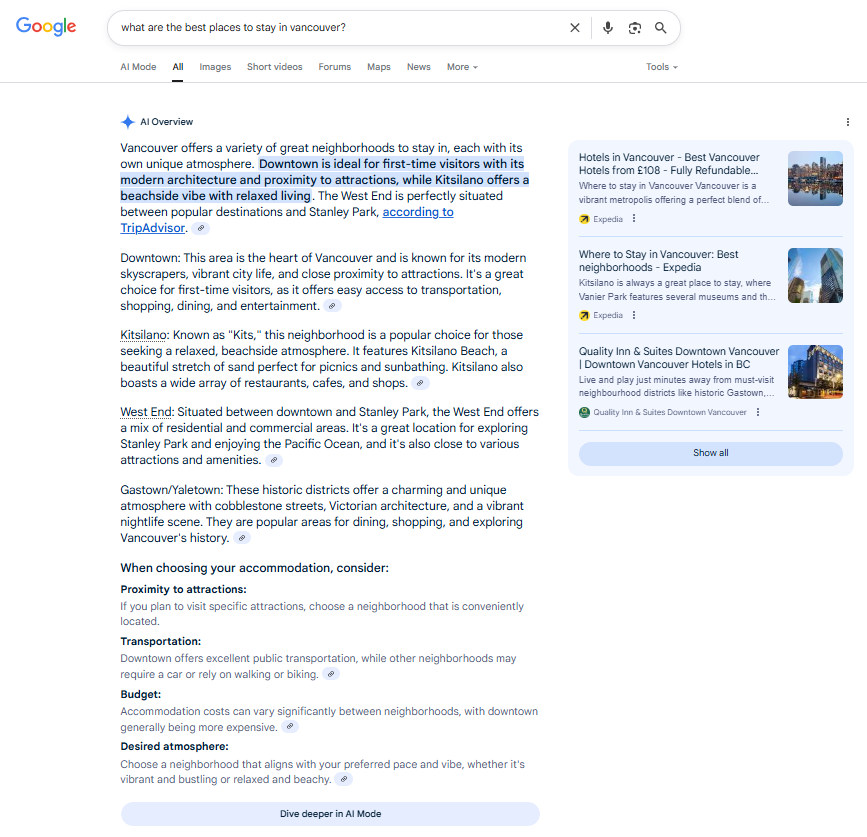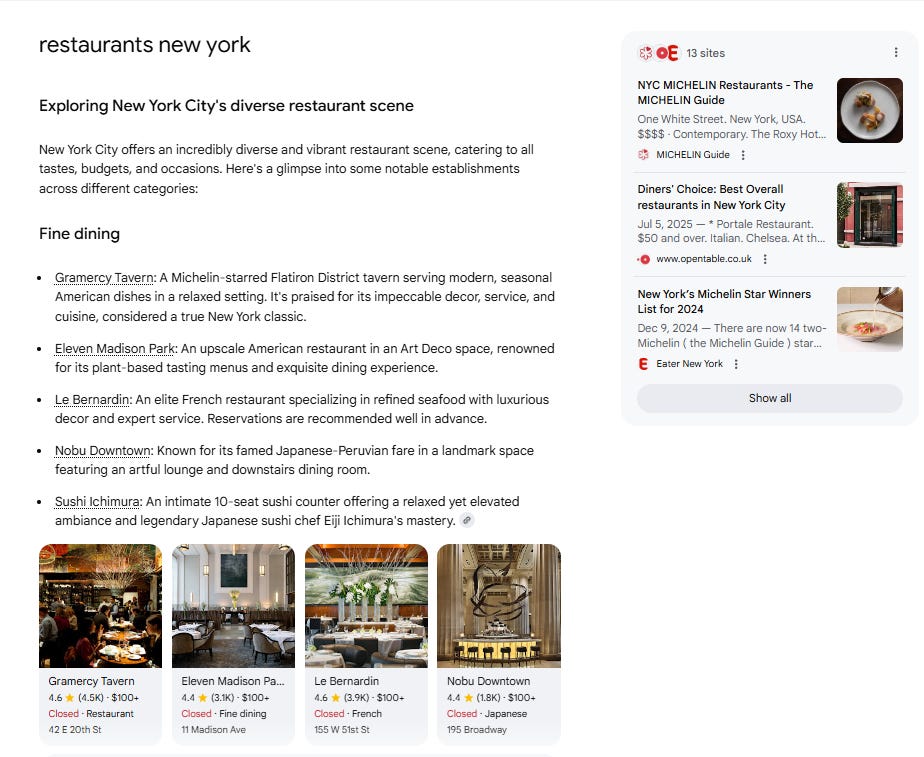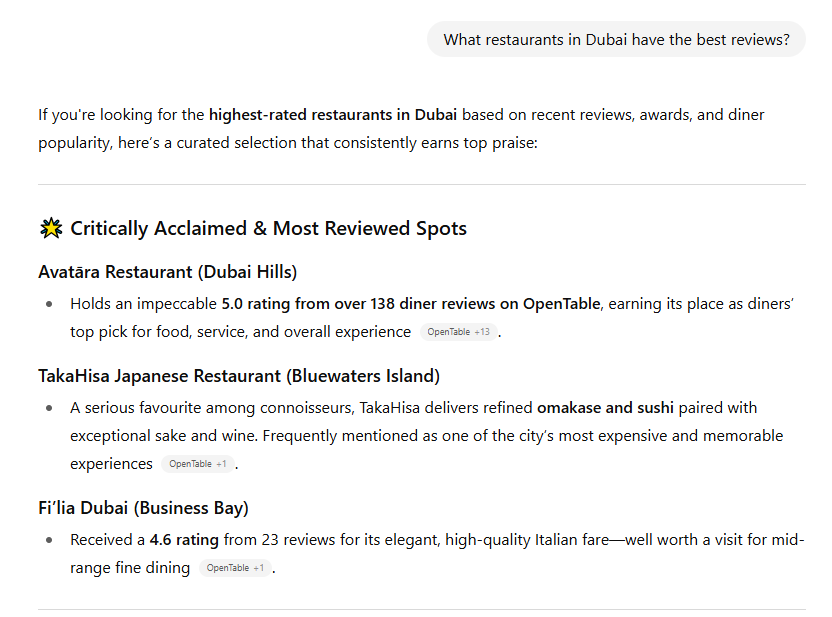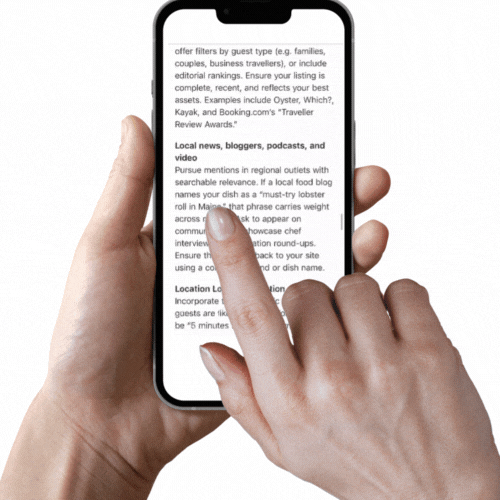📌 Why Your Venue Isn't Showing Up in AI Search (and What to Do About It)
If AI can’t read or trust your content, you won’t appear. Learn how search has changed, and what hospitality brands must do to stay visible.
🌞 Welcome To This Week's Newsletter
I’m often asked if AI search is just a trend or if it will change how people choose hotels and restaurants. The shift is already happening. In the last few months, AI has quietly reshaped how guests discover, compare, and book. Google’s AI Mode is rolling out, and ChatGPT is handling over 2.5 billion prompts a day, and many of those are travel decisions. 35% of all travellers used AI to discover destinations, marking a 74% increase from 2024. Buyers aren’t searching. They’re asking. And if you’re not in the answer, you may not exist in the buyer’s mind.
Traditional SEO tactics like page optimisation and rank tracking no longer guarantee visibility.
AI search doesn’t draw information from and then return web pages; it creates summaries that draw on multiple sources. These sources change with every query; this can include sources you’re not aware of or that you can influence.
Here’s what this newsletter will break down:
Why Buyer Behaviour is Changing
Understanding Traditional Search and Its Limitations
How Large Language Models work
AI Search and Its Implications for Hospitality
Visibility Playbook for VIP Members
Let’s Check In ☕
📩 Stop wasting effort on platforms that don’t deliver. Share this newsletter with:
Marketing – to sharpen content strategy and boost AI-driven visibility
Revenue/Reservations – to understand evolving guest search behaviours and optimise conversion
Operations – to coordinate website updates, schema markup, and data consistency
Customer Experience – to align messaging with what AI-powered guests expect and seek
👨👩👧 Buyer Behaviour
AI usage in travel planning has surged across all generations. Boomers saw a 61% year-on-year increase in AI-assisted bookings this summer, saying that AI helped them cut through the noise. Gen Z (52%) and Millennials (49%) remain the most active users.
Restaurant-focused planning is also shifting. 56% of respondents report using AI tools when searching for restaurants.
However, adoption isn’t uniform across geographies or guest segments. In high-growth markets like China (98%), India (94%), and Mexico (91%), most travellers are open to AI. But in more traditional destinations, usage is slower. Only 63% of UK and German travellers say they would consider AI, along with 62% in Canada and Australia. The United States sits at 69%.
This split in adoption is why relying on traditional visibility tactics no longer works consistently.
In high-adoption markets, AI systems are already shaping booking decisions. In slower regions, guests may still discover you through search, but that window is narrowing. The old playbook still functions, but only partially.
🔍 Traditional Search
For years, being on the first page of Google was the goal. Over 90% of all clicks happened there. The top three results alone captured nearly 70% of traffic, and the #1 position could deliver as much as 39.8% of clicks. Very few users looked further. Only 0.63% clicked on anything beyond the first page.
Traditional search engines were built around keywords. You typed a phrase. The system matched it to its index and returned a ranked list of links. The better your keywords and backlinks, the higher you appear. This process rewarded volume over clarity and rewarded anyone who learned how to manipulate it.
This led to ‘black-hat’ tactics: stuffing pages with repeated terms, chasing backlinks from directories, and writing content to please algorithms, not people. It worked until Google's systems began introducing new layers of interpretation.
In 2024, AI-generated summaries began appearing at the top of search results. These pull answers from multiple sources and reduce the need for users to click through.
This change has affected performance across the board. A #1 ranking now sees a 34.5% drop in clicks when an AI summary is present. Pew Research found that users click on links only 8% of the time when summaries are shown, compared to 15% without. In many cases, users do not click at all.
Search began as a way to match words. It is now being replaced by systems that interpret meaning. This change is powered by a different kind of technology, one that learns patterns, context, and intent from language itself. To understand how that works, we need to look at Large Language Models.
🤖 Large Language Models Explained
LLMs (Large Language Models) are a type of artificial intelligence trained on vast amounts of text data to understand and generate human-like language. ChatGPT, Gemini, Claude, and Bing Copilot are all examples of tools powered by LLMs.
LLMs go further than traditional search; they interpret what you mean, not just what you say or type. This allows them to return answers even if your query doesn't contain the exact keywords. Visibility now depends on whether your content can answer the question.
LLM Memory
LLMs build a form of “memory” by recognising which content formats, signals, and styles are most frequently rewarded. It’s not memory in the human sense. LLMs don’t “remember” you or specific past queries unless designed to (like ChatGPT with memory on). Instead:
During training, they see patterns repeated thousands or millions of times, like which types of phrases are used to answer questions about “best boutique hotels” or “family-friendly resorts in Devon.”
Over time, they learn which formats, brands, citations, and types of content consistently show up when certain questions are asked.
That creates statistical bias in their answers, favouring certain sources, structures, and tones, even if you haven’t optimised for them directly.
In hospitality marketing, that means repetition and structured storytelling are critical. The model can’t reliably recommend you if it’s never “seen” you in the types of content that match the query pattern.
Here’s what that means in practice:
Repetition builds presence in the model’s “mental map.” If your brand is consistently mentioned in context (e.g. “eco-friendly hotel in Cornwall”), the model starts to associate your name with that concept. No repetition = no association = no citation.
Narrative role defines how you're framed. Are you the trusted example? The cautionary tale? The default? LLMs don’t just index content; they assign roles based on tone, context, and comparison.
If your venue is only mentioned in passing or appears in someone else’s review without detail, the model won’t treat you as important. You’ll be included as background, not as the main example. To be shown in AI results, your brand needs to appear clearly, frequently, and in a leading role across multiple sources.
📡 AI Search
AI supports two distinct types of decision-making in travel and hospitality. In augmented searches, it offers suggestions and comparisons to help people narrow down their options. In agentic search, it acts more decisively, filtering results, generating itineraries, or recommending a single venue based on the user’s needs.
Queries phrased as full sentences, especially those that include both a noun and a verb, triggered summaries 36% of the time. Meanwhile, question-based searches were the most likely to invoke an AI response, with 60% of queries beginning with “who,” “what,” “when,” or “why” generating an Overview.
🧠 Augmented Search
In Augmented Search, AI plays a supporting role. Tools like Bing Copilot or the Google side panel help refine choices or compare features, but the user still makes the final decision. In this model, visibility comes from being clear, well-structured, and easy for the AI to quote and summarise.
Google AI Mode
Google AI Mode is a feature rolling out across Search, designed to provide users with instant answers instead of a list of links. When enabled, it rewrites how results appear by placing an AI-generated summary at the top of the page. These summaries pull from multiple sources, including reviews, the user’s gmail, official websites, blog content, and structured data.
The AI mode can break down broad queries into sub-questions, check context from the user’s history (if logged in), and offer recommendations based on behaviour patterns. For example, someone who frequently books pet-friendly hotels will see those options highlighted first.
👤 Agentic Search
In some cases, it acts as the decision-maker. This is known as agentic search. Platforms like Gemini, and ChatGPT don’t just help users find information—they interpret the query, gather data from multiple sources, and generate a single, confident recommendation. In some cases, they’ll even plan an itinerary or make a booking. The guest never sees a full list of options. If your property isn’t named in that response, it isn’t considered.
ChatGPT is the New Travel Agent
Travellers aren’t just experimenting with ChatGPT; they’re trusting it. From early-stage inspiration to final decisions, ChatGPT is acting as a personal concierge. People ask where to go, what to eat, and which hotel has the best view for under £200. They ask for restaurant suggestions with outdoor seating, late check-out times, or accessible bathrooms. Some ask for itineraries, others for summary comparisons of TripAdvisor reviews or help deciding between packages.
ChatGPT reduces friction in the decision-making process. It narrows the booking window from vague interest to clear intent.
Examples
Give me a 3-day Paris itinerary with food markets, boutique hotels under £250, and a rooftop bar.
Is [Hotel Name] good for solo travellers?
Which Thai restaurants in Manchester have vegan options and lots of reviews?
Google Gets on the Phone So You Don’t Have To
Google is beginning to act on behalf of the guest. With its latest AI features, Google Search can now perform tasks like calling businesses, comparing availability, and summarising service details. The user no longer needs to visit your website.
For example, a search for “Italian restaurants near me” may include an option for the AI to “check allergy information.” The system then contacts local venues, gathers menu and safety details, and presents a filtered shortlist based on the guest’s needs.
Google has been working on this function for several years. Here’s a video of the technology in action: Google's AI Assistant Can Now Make Real Phone Calls
Before we get into the VIP visibility tactics, I’d love to know what you’re planning to act on first. Your response helps shape what I write about next. Thanks for voting!
🗝️ Join Me in the VIP Lounge 🔒
New tools, new trends, constant updates. I’ll show you what’s changed and exactly how to use it to stay ahead of the competition.
This week in the Lounge
How to get found by AI - which sites to be present on
Website checklist for Hotels and Restaurants
How to protect your reputation from unwanted search results
Advanced tactics to give you a competitive advantage
You can also ask questions in the member-only comments, where I’ll reply with practical, tactical advice, without the consulting fee.
Let’s get to work 👇
📘 Visibility Playbook
While AI platforms rely on thousands of signals to shape responses, the factors that influence visibility are surprisingly consistent. These signals determine whether your brand is included or ignored.
Hospitality visibility depends on answerability.
Many operators assume that appearing in AI results is enough. It is not. If your hotel or restaurant booking tools are not machine-readable or your content lacks structure, you may be excluded from the shortlist. The AI may find you, but it cannot act on your behalf.
🧭 AI Source Strategy
Here’s how the major platforms source, filter, and rank content, and what that means for hospitality visibility.







